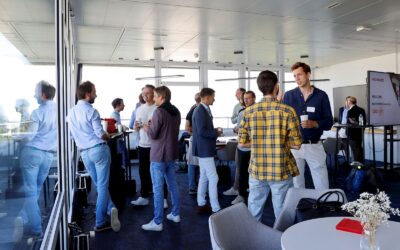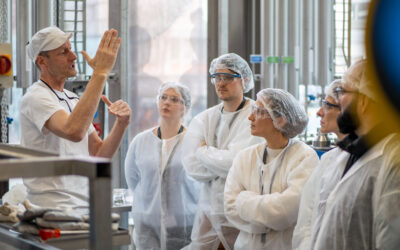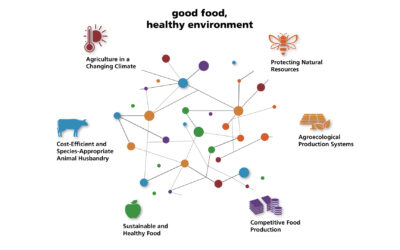EPFL President and new SFNV Steering Committee member Anna Fontcuberta on shaping the future of food

Switzerland is home to some of the world’s most advanced research institutions, driving innovation at the intersection of science, technology, and food. As the President of Valley partner EPFL and an expert in nanotechnology, Anna Fontcuberta i Morral brings a unique perspective to the Swiss Food & Nutrition Valley (SFNV) Steering Committee. Her work explores how scientific breakthroughs can translate into real-world impact – a vision that aligns closely with SFNV’s mission to pioneer more future-proof food systems, together.
We caught up with Anna to hear her thoughts on Switzerland’s leadership in food innovation, the role of cutting-edge research in transforming the industry, and her hopes for the Valley’s future.
Anna, welcome to the Valley! What would you like to achieve as a member of the SFNV Steering Committee?
I’m thrilled to help coordinate efforts and foster a more sustainable ecosystem around nutrition. Science thrives when it breaks out of silos. It allows us to draw inspiration from society’s needs and find new solutions to better address them.
In your view, what sets Switzerland apart as a hub for food and nutrition innovation – and how can it maintain this leadership?
Switzerland is the ideal hub for innovation in healthy and sustainable food. With a strong ecosystem of start-ups, SMEs, and multinationals in biotech and foodtech, we are well-positioned to drive this mission forward. To sustain our leadership, coordination and collaboration through the SFNV will be essential. It has the potential to serve as a catalyst and evolve into a globally recognised center of excellence.
Many EPFL departments are working on cutting-edge research at the intersection of science, technology, and food. What role do you see EPFL playing in driving the food system transformation and how can ecosystem actors get involved?
Our role is to advance knowledge and to provide answers and solutions to emerging scientific and societal questions. Currently, I see two key global challenges that we need to tackle: we need a more sustainable food ecosystem from farm to fork, as well as new knowledge to improve the aging experience and address metabolic health challenges.
The role of science is fundamental in this regard. I believe that science may become increasingly important in understanding the processes involved in food processing and assimilation. Food packaging is another example. EPFL researchers are currently working on creating innovative solutions that are sustainable, economically viable, and increasingly accepted by buyers.
How do you think the research innovations we’re developing today will shape the future of food in the next 10–20 years?
As this is not my field of research, I may not have the full picture. But I believe that there are a few innovations that will have a significant impact on society.
First, science and technology can provide solutions to address climate change. On one hand, science can provide pathways to improve soil health and help agricultural practices adapt to the changing climate conditions. On the other hand, bioengineering can help us find new sources of high-quality plant protein and reduce our dependence on animal protein, reducing greenhouse gas emissions. Finally, there is the concept of precision nutrition or personalised nutrition. Analysing an individual’s DNA, microbiome, and metabolic response to specific foods can offer valuable insights for identifying the most suitable diet to prevent or even treat disease.
What does sustainable and innovative food mean to you personally?
Some of my fondest childhood memories of food are from the summer – picking pears and peaches straight from the trees at home and savoring the tomatoes my grandfather grew. I rarely find this richness in taste today. Is it because of the changes in agriculture practices? For me, sustainable food means fostering sustainable and resilient soils and sustainable agricultural practices across the globe to ensure that we all have access to healthy, enjoyable food every day.
Is there a message you’d like to share with the SFNV community?
Let’s work together to shape a more sustainable, reliable and healthy food ecosystem! I truly believe that everyone can make a significant contribution.
On the EPFL campus, we do whatever it takes to support everyone who is willing to create a better future: from meatless meals and washable lunch boxes to participatory gardens. And it works: in just a few years, collaborators and students have changed their habits – and they now prompt us to do even more to improve the quality and impact of the food we buy and consume.
Sign up for quarterly Swiss food innovation updates
Latest News
Scale-up Vaud announces the 44 companies newly labelled for 2026
Scale-Up Vaud celebrates its 10th...
OneAgrix holds USPTO patent-pending status for agentic AI trade infrastructure supporting regulated global food supply chains
Valley partner, OneAgrix, a Swiss- and...
HES-SO Valais-Wallis brings together European experts for extrusion training focused on food technologies
Valley partner HES-SO Valais-Wallis,...
Agroscope’s new work programme places a greater focus on impact and practical benefits
Agroscope’s 2026-2029 Work Programme...



